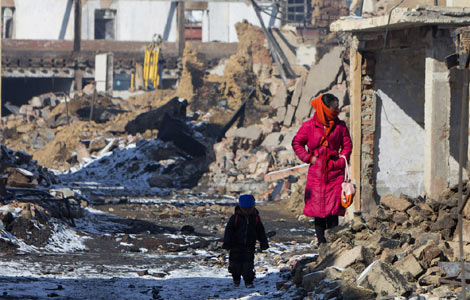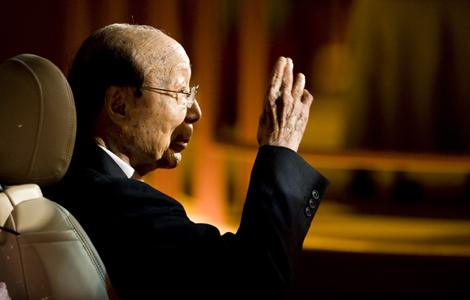Syria peace conference to proceed without Iran
Updated: 2014-01-21 10:00
(Xinhua)
|
|||||||||||
UNITED NATIONS-- Dismayed by developments over a Syrian peace conference slated for Montreux, Switzerland later this week, UN Secretary-General Ban Ki-moon decided Monday it would proceed without Iran, despite his earlier invitation extended to Tehran.
A turmoil erupted after Iran, a major backer of Syrian President Bashar al-Assad, was invited on Sunday to the Montreux meeting, scheduled for Wednesday and a prelude to actual talks planned for Friday between the Syrian government and opposition delegations.
Invited to the Montreux session were dozens of countries which had agreed to the 2012 Geneva Communique calling for an end to fighting and installation of a transitional government "with full executive powers."
Several countries objected to Iran's participation but Ban said he had been assured orally of Iran's acceptance of the Geneva Communique. Then, earlier on Monday, an Iranian Foreign Ministry spokeswoman did not articulate that agreement.
Ban's spokesman Martin Nesirky said at a regular mid-day briefing that because of the developments Ban was "urgently considering his options," indicating that the session could be in jeopardy.
In late afternoon, Nesirky read a statement to reporters saying the conference would go-ahead without Iran.
"The secretary-general is deeply disappointed by Iranian public statements today that are not at all consistent with that stated commitment," Nesirky said. "He continues to urge Iran to join the global consensus behind the Geneva Communique. Given that it has chosen to remain outside that basic understanding, he has decided that the one-day Montreux gathering will proceed without Iran's participation."
"The secretary-general looks forward to joining the initiating parties -- the Russian Federation and the United States -- as well as the other States and organizations that will attend this long- awaited and hugely important push for peace," he concluded, adding that the Syrian parties, the region and the international community have an opportunity and a responsibility to end the violence and begin a transition towards a new Syria.
The statement also noted that, "During the brutal conflict of the past three years, the Syrian people have experienced horrendous suffering, humanitarian shortages and human rights abuses."
"The Geneva Communique of June 30, 2012 remains the internationally agreed framework for ending the crisis," Nesirky stressed. It is the basis on which the global community will gather on Wednesday in Montreux, Switzerland, and the foundation for the negotiations between the Syrian parties that will begin on Friday in Geneva.
Nesirky continued to say that throughout the Syrian conflict, the UN chief has sought to do "everything within his power for a political solution, which is the only path forward."
Ban has consistently maintained that regional partners with influence on the Syrian parties should do their part in promoting implementation of the Geneva Communique, including the establishment of a transitional governing body with full executive powers, said the spokesman.
"Most recently, he has tried to ensure that all those who can contribute to the success of a Syrian peace process be present in Montreux to express their solidarity and support for the Syrian people," Nesirky said.
"In that spirit, in a series of meetings and telephone conversations, senior Iranian officials assured the secretary- general that Iran understood and supported the basis and goal of the Conference, including the Geneva Communique," he said.
However, he added, "Iran, despite assurance provided orally to the secretary-general, has made a disappointing public statement," suggesting it refused to back a June 2012 plan for a political transition in Syria.
Related Stories
Iran to activate nuclear deal 2014-01-21 07:58
EU suspends sanctions against Iran 2014-01-21 00:30
Iran halts higher-grade uranium enrichment 2014-01-20 18:50
Syria looks to Geneva for peace 2014-01-21 07:58
Five principles for Syria peace 2014-01-21 07:20
China expresses hope for Syria talks 2014-01-20 22:50
Today's Top News
West, Iran activate landmark nuclear deal
Baghdad bomb blasts kill 26
Iran not to accept Geneva communique
China to deepen ties with Belarus
Danish minister tours Beijing on her bicycle
EU suspends sanctions against Iran
US warns sanctions against Ukraine
Human spread of H7N9 'sporadic'
Hot Topics
Lunar probe , China growth forecasts, Emission rules get tougher, China seen through 'colored lens', International board,
Editor's Picks

|

|

|

|

|

|





